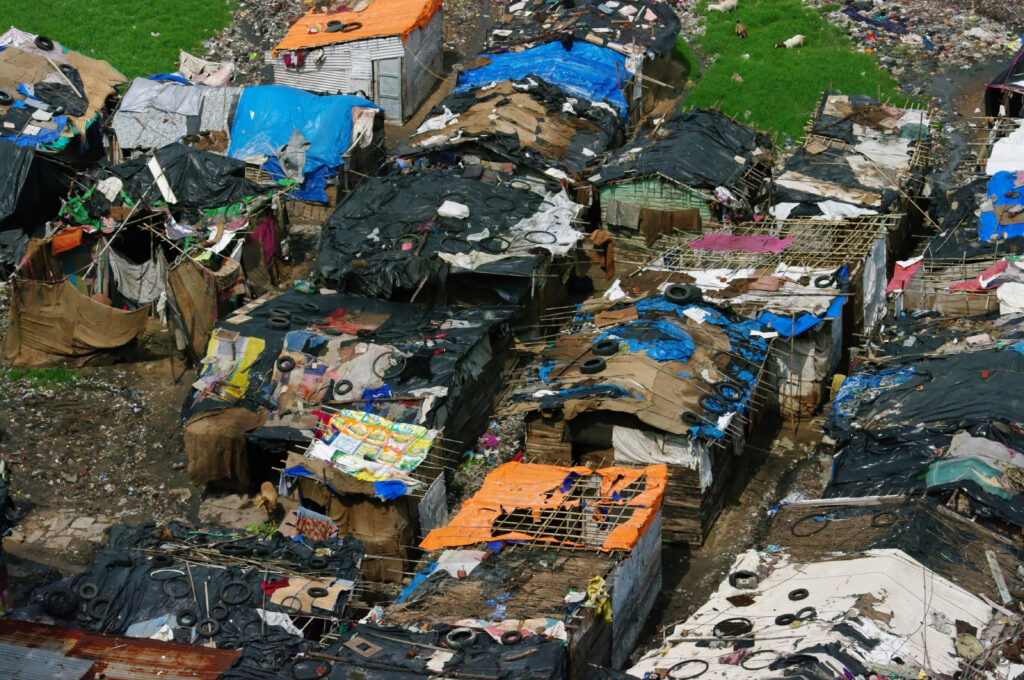While migration offers economic and livelihood opportunities, it also brings forth challenges with sanitation being a prominent concern. Reaching urban cities, migrant workers often find themselves living in informal settlements. These are densely populated and lack basic amenities.
Despite initiatives like Swachh Bharat Mission, poor sanitation remains a problem in many parts of India. It leads to various health issues like diarrhea, vector-borne diseases (those caused by parasites, viruses and bacteria), and other hygiene-related illnesses. Waterborne diseases can also result from contaminated water sources, often linked to inadequate sanitation. Overcrowding, limited access to clean water and poor waste disposal systems further exacerbate health risks. The serious lack of infrastructure leads to overflows and malfunctions in sewage systems.
Saya*, an 18 year old girl from a village in south Rajasthan says that she has to get up early in the morning, latest by 4 am to take care of her basic sanitation needs. Lack of availability of water makes it more challenging especially when she is menstruating. Open defecation in busy and crowded cities where they dwell during migration is a huge task.
Lack of awareness on how to practice sanitation also leads to improper waste disposal. It further complicates the challenge in urban areas. Along with infrastructure development, educating both the local and migrant populations about the importance of good practices can lead to better outcomes. Recognizing people’s needs during urban planning can ensure that everyone has access to basic services.
Most of the migrant labourers work on construction sites and live in open spaces. For example, under the bridge, on foot paths, bus depots, and railway stations. Many of them work as waste pickers or street vendors. There’s often no roof over their head even in slums and temporary settlements provided by the employers. Shared toilets, if available, are often in deplorable conditions. Majority of the migrant population in India are unable to afford housing in cities where they migrate for work.
Women suffer more, especially pregnant and lactating mothers. In the absence of clean and safe toilets, women not only face health risks but are also vulnerable to harassments.
I remember seeing pregnant women in labour settlements of Mumbai pacing towards the mangroves beside factories where they are working, with a bottle of water to defecate. There’s no water supply in their settlements. Children who accompany their parents to cities while mostly living in makeshift shelters face severe challenges like lack of unsafe surroundings.
Stigma associated with being a migrant also contributes to the problem. More so specially if they speak a different language, come from a different state or belong to a marginalised community. This further limits their access to public amenities and increase their vulnerability to hygiene related issues.

As the outsider image of the migrant worker is prevalent, one often perceives them as unhygienic, criminals and anti-social elements. People also see them as ‘carriers’ of diseases. We got to witness this during COVID lockdown in the year 2020. They were excluded and alienated for the same reason. Neither did we welcome them in the city nor accepted them when they returned to their native villages. When they walked back home thousands of kilometres, highways didn’t have enough public toilets. Restaurants and local eateries were closed and access to bathroom was limited. This highlighted the sanitation challenges migrants face even outside their usual urban settings.
There are a number of paid toilets in operation near to migrant settlements, exploiting their basic dignity. These facilities were expected to offer running water but they failed to do so, leaving users to transport water from far away hand pumps.
– Dulidas*, a 45-year old man who lives in makeshift shelters in Ahmedabad
Even though the government and private initiatives have begun constructing public toilets and conducting awareness campaigns on the importance of hygiene, the scale of migration and rapid urbanization makes it a daunting task. Ensuring free, round the clock, and gender inclusive public sanitation services in migrant-dense clusters can be a major change to deal with the situation.
There is undoubtedly an urgent need for inclusive planning and policy-making that considers the welfare of migrant workers. Proper sanitation is a fundamental human right, and ensuring it for everyone can significantly improve quality of life and overall well-being. Open defecation, un-functional public toilets, unusable dry toilets without proper drainage system and the prevailing practice of manual scavenging are continous struggles of migrant labourers reaching cities for livelihoods.
*Name changed to maintain confidentiality




One issue that I have observed is, any public facility built under government scheme soon after inauguration is locked and not open for use. Have you observed these locked sanitation facilities too?